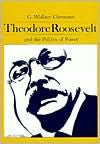Denison University presents Theodore Roosevelt and the Politics of Power by G. Wallace Chessman. Poised at a strategic point in the emergence of modern America, Theodore Roosevelt entered the White House just as the twentieth century opened. Following a succession of weak presidents who proved themselves incapable of dealing seriously with the novel problems and responsibilities created by industrialization within the country and by imperialism in the world outside its boundaries, Roosevelt was uniquely qualified by training and personality to reverse the trend. His patrician background, his education, and his grasp of the national and international situations set him apart from the men he succeeded in Washington. His vigorous, colorful, forceful personality attracted widespread public attention and deep affection. As a result, he was able to face problems that his predecessors had avoided. In matters like labor and conservation, Roosevelt established fruitful precedents for the country. In others, diplomacy for instance, he made false starts. But in any case, he illuminated the questions with which his successors would have to deal. Legend, or near legend, Roosevelt dominated an era in American life. An examination of his multiple careers throws light on the problems of transition of the U.S. from the nineteenth to the twentieth century.


